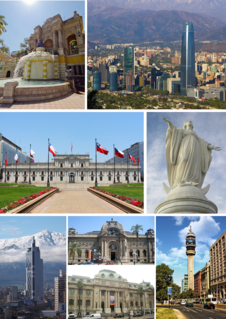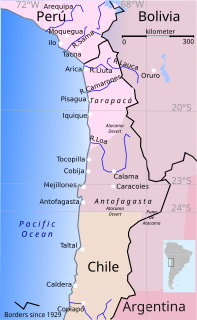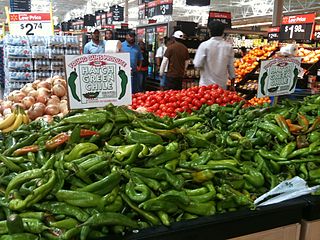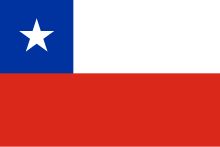
Chile, officially the Republic of Chile, is a country in western South America. It occupies a long, narrow strip of land between the Andes to the east and the Pacific Ocean to the west. Chile covers an area of 756,096 square kilometres (291,930 sq mi) and has a population of 17.5 million as of 2017. The capital and largest city is Santiago and the national language is Spanish.

South America is a continent in the Western Hemisphere, mostly in the Southern Hemisphere, with a relatively small portion in the Northern Hemisphere. It may also be considered a subcontinent of the Americas, which is how it is viewed in most of Europe and the Spanish and Portuguese-speaking regions of the Americas. The reference to South America instead of other regions has increased in the last decades due to changing geopolitical dynamics.

Salvador Guillermo Allende Gossens was a Chilean socialist politician and physician, President of Chile from 1970 until 1973, and head of the Popular Unity political coalition government; he was Latin America's first ever Marxist to be elected president in a country with liberal democracy.

Santiago, also known as Santiago de Chile, is the capital and largest city of Chile as well as one of the largest cities in the Americas. It is the center of Chile's most densely populated region, the Santiago Metropolitan Region, whose total population is 7 million, of which more than 6 million live in the city's continuous urban area. The city is entirely located in the country's central valley. Most of the city lies between 500–650 m (1,640–2,133 ft) above mean sea level.

Patagonia is a sparsely populated region at the southern end of South America, shared by Argentina and Chile. The region comprises the southern section of the Andes Mountains, lakes, fjords, and glaciers in the west and deserts, tablelands and steppes to the east. Patagonia is bounded by the Pacific Ocean on the west, the Atlantic Ocean to the east, and many bodies of water that connect them, such as the Strait of Magellan, the Beagle Channel, and the Drake Passage to the south.

The chili pepper, from Nahuatl chīlli, is the fruit of plants from the genus Capsicum which are members of the nightshade family, Solanaceae. Chili peppers are widely used in many cuisines as a spice to add heat to dishes. The substances giving chili peppers their intensity when ingested or applied topically are capsaicin and related compounds known as capsaicinoids.

The War of the Pacific, also known as the Saltpeter War and by multiple other names, was a war between Chile and a Bolivian–Peruvian alliance. It lasted from 1879 to 1884, and was fought over Chilean claims on coastal Bolivian territory in the Atacama Desert. The war ended with victory for Chile, which gained a significant amount of resource-rich territory from Peru and Bolivia. Chile's army took Bolivia's nitrate-rich coastal region and Peru was defeated by Chile's navy.

The 1960 Valdivia earthquake or the Great Chilean earthquake on 22 May 1960 is the most powerful earthquake ever recorded. Various studies have placed it at 9.4–9.6 on the moment magnitude scale. It occurred in the afternoon, and lasted approximately 10 minutes. The resulting tsunamis affected southern Chile, Hawaii, Japan, the Philippines, eastern New Zealand, southeast Australia, and the Aleutian Islands.

The Mapuche are a group of indigenous inhabitants of present-day south-central Chile and southwestern Argentina, including parts of present-day Patagonia. The collective term refers to a wide-ranging ethnicity composed of various groups who shared a common social, religious, and economic structure, as well as a common linguistic heritage as Mapudungun speakers. Their influence once extended from Aconcagua Valley to Chiloé Archipelago and spread later eastward to the Argentine pampa. Today the collective group makes up over 80% of the indigenous peoples in Chile, and about 9% of the total Chilean population. The Mapuche are particularly concentrated in the Araucanía region. Many have migrated from rural areas to the cities of Santiago and Buenos Aires for economic opportunities.
LATAM Airlines, formerly LAN Airlines S.A. and LAN-Chile, is an airline based in Santiago, Chile, and is one of the founders of LATAM Airlines Group, Latin America's largest airline holding company. The main hub is Comodoro Arturo Merino Benítez International Airport (Santiago), with secondary hubs in El Dorado (Bogotá), Jorge Chávez (Lima), Mariscal Sucre (Quito), José Joaquín de Olmedo (Guayaquil) and Jorge Newbery airports.

The 1973 Chilean coup d'état was the overthrow of the socialist President of Chile Salvador Allende by the army and national police. It followed an extended period of social unrest and political tension between the opposition-controlled Congress of Chile and the socialist President Salvador Allende, as well as economic warfare ordered by US President Richard Nixon.

The Chile national football team represents Chile in men's international football competitions and is controlled by the Federación de Fútbol de Chile which was established in 1895. The team is commonly referred to as La Roja. They have appeared in nine World Cup tournaments and were hosts of the 1962 FIFA World Cup where they finished in third place, the highest position the country has ever achieved in the World Cup.

The Chilean Navy is the naval force of Chile.

Ricardo Eliécer Neftalí Reyes Basoalto, better known by his pen name and, later, legal name Pablo Neruda, was a Chilean poet-diplomat and politician who won the Nobel Prize for Literature in 1971. Neruda became known as a poet when he was 13 years old, and wrote in a variety of styles, including surrealist poems, historical epics, overtly political manifestos, a prose autobiography, and passionate love poems such as the ones in his collection Twenty Love Poems and a Song of Despair (1924).

Chileans are people identified with the country of Chile, whose connection may be residential, legal, historical, or cultural. For most Chileans, several or all of these connections exist and are collectively the source of their Chilean identity. Chile is a multilingual and multicultural society, home to people of many different ethnicities and religions. Therefore, many Chileans do not equate their nationality with ethnicity, but with citizenship and allegiance to Chile. The overwhelming majority of Chileans are the product of varying degrees of admixture between European ethnic groups with Amerindian peoples indigenous to Chile's modern territory.

The President of Chile, officially known as the President of the Republic of Chile is the head of state and head of government of Chile. The President is responsible for both the Chilean government and state administration. Although its role and significance has changed over the history of Chile, as well as its position and relations with other actors in the national political organization, it is one of the most prominent political figures. It is also considered as one of the institutions that make up the "Historic Constitution of Chile", and is essential to the country's political stability.

Augusto José Ramón Pinochet Ugarte was a Chilean general and politician who ruled as dictator of Chile from 1973 to 1990, first as the President of the Military Junta of Chile from 1973 to 1981, before being auto declared President of the Republic by the junta in 1974.

The Atacama Desert is a desert plateau in South America covering a 1,000 km (600 mi) strip of land on the Pacific coast, west of the Andes Mountains. The Atacama Desert is the driest nonpolar desert in the world, as well as the only true desert to receive less precipitation than the polar deserts. According to estimates, the Atacama Desert occupies 105,000 km2 (41,000 sq mi), or 128,000 km2 (49,000 sq mi) if the barren lower slopes of the Andes are included. Most of the desert is composed of stony terrain, salt lakes (salares), sand, and felsic lava that flows towards the Andes.

New Mexico chile or New Mexican chile is a group of cultivars of the chile pepper from the US State of New Mexico, first grown by Pueblo and Hispano communities throughout Santa Fe de Nuevo México. These heritage chile plants were used to develop the modern New Mexico chile peppers by horticulturist Fabián Garcia and his students, including Roy Nakayama, at what is now New Mexico State University in 1894. New Mexico chile, which typically grows from a green to a ripened red, is popular in the cuisine of the Southwestern United States, the broader Mexican cuisine, and Sonoran and Arizona cuisine, and an integral staple of New Mexican cuisine. Chile is one of New Mexico's state vegetables, and is referenced in the New Mexico state question "Red or Green?".

The COVID-19 pandemic in Chile is part of the worldwide pandemic of coronavirus disease 2019 caused by severe acute respiratory syndrome coronavirus 2. The virus was confirmed to have reached Chile in March 2020. As of March 2020 there is a considerable COVID-19 outbreak in Chile. While initial cases had been imported from South East Asia and Europe, they expanded into a sizeable quantity of untraceable infections, placing the country within phase 4 of the pandemic as defined by the WHO, and surpassing a thousand confirmed cases on 25 March 2020.


















